Wikipedia:Picture of the day/July 2014
|
Featured picture tools: |
These featured pictures, as scheduled below, appeared as the picture of the day (POTD) on the English Wikipedia's Main Page in July 2014. Individual sections for each day on this page can be linked to with the day number as the anchor name (e.g. [[Wikipedia:Picture of the day/July 2014#1]] for July 1).
You can add an automatically updating POTD template to your user page using {{Pic of the day}} (version with blurb) or {{POTD}} (version without blurb). For instructions on how to make custom POTD layouts, see Wikipedia:Picture of the day.Purge server cache
July 1

|
The Centre Block is the main building of the Canadian parliamentary complex on Parliament Hill, in Ottawa, Ontario. It contains the House of Commons and Senate chambers, as well as offices and several ceremonial spaces. Built in the Gothic Revival style, the present Centre Block is the second iteration of the building, after the first was destroyed by fire in 1916. Photo: W. Lloyd MacKenzie
Recently featured:
|
July 2

|
|
A diagram of a mechanical mouse, showing how these pointing devices operate.
Diagram: Jeremykemp and Pbroks13
Recently featured:
|
July 3
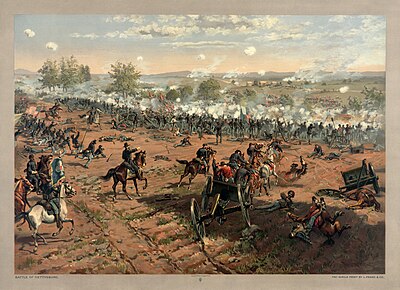
|
Pickett's Charge was an infantry assault during the American Civil War. It was ordered by Confederate General Robert E. Lee against Major General George Meade's Union positions on Cemetery Ridge on July 3, 1863, the last day of the Battle of Gettysburg. The assault, led by three generals including George Pickett, was ultimately futile; the Confederate forces were repulsed and suffered a 50% casualty rate. The furthest point reached during the charge has been termed the high-water mark of the Confederacy. Illustration: Thure de Thulstrup; restoration: Adam Cuerden
Recently featured:
|
July 4

|
The engrossed copy of the United States Declaration of Independence, which was ratified on July 4, 1776, and signed over the following months. The history of this document is one of reverence and neglect. After being signed, it was moved several times, first with the Continental Congress and later with the Secretary of State. When the British razed Washington during the War of 1812, it was evacuated to Virginia. From 1841 to 1876, the document was on public display in conditions which caused it to fade drastically. Consequently, from 1892 to 1922 it was stored between two glass plates and exhibited only rarely. After a period at the Library of Congress, the engrossed copy is now held by the National Archives. It is exhibited in a titanium-aluminum case filled with argon. Document: Thomas Jefferson et al.
Recently featured:
|
July 5

|
Vipera xanthina is a venomous viper species found in northeastern Greece and Turkey, as well as certain islands in the Aegean Sea. The species, which averages 70–95 cm (27.6–37.4 in) in length, feeds on small mammals and birds. Photo: Benny Trapp |
July 6
|
Machu Picchu, a 15th-century Peruvian Inca site located 2,430 metres (7,970 ft) above sea level, as viewed from Huayna Picchu. Established c. 1450, the settlement was abandoned at the time of the Spanish Conquest the following century. Although it remained known locally, it was not brought to international attention until after Hiram Bingham visited the site in 1911. Machu Picchu is now a popular tourist destination and UNESCO World Heritage Site, and restoration efforts are ongoing. Photo: Martin St-Amant |
July 7

|
An 1898 advertisement for Ivory, a brand of bar soap first sold by Procter & Gamble in 1879. Air is whipped into the soap during production so that it will float on water; the slogan "It floats!" was first used in 1891. Poster: Strobridge Lithograph Company; restoration: Adam Cuerden |
July 8
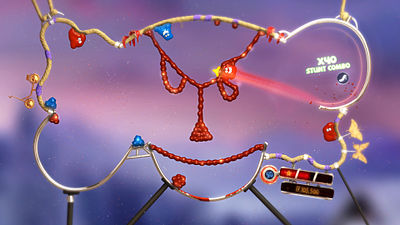
|
The Splatters is a physics-based puzzle video game for the Xbox 360's Xbox Live Arcade, developed by SpikySnail Games and published by Microsoft Studios in 2012. In the game, players use anthropomorphized globs of goo to clear bombs scattered across each level; bombs may only be detonated by goo of the same color. The game received mixed reviews upon release. Screenshot: SpikySnail Games
Recently featured:
|
July 9

|
The red-crested pochard (Netta rufina) is a large diving duck which breeds in the lowland marshes and lakes of southern Europe and Central Asia and winters in the Indian Subcontinent and Africa; this specimen was photographed in the London Wetland Centre in Barnes. These gregarious birds are classified least concern by the International Union for Conservation of Nature. Photo: David Iliff
Recently featured:
|
July 10

|
The HEALPix projection is a family of map projections, the members of which are distinguished by their H and K parameters that describe the specific arrangement. The H=4, K=3 HEALPix projection, as shown here applied to Earth, maps the sphere to twelve square facets (diamonds) on the plane, then divides these facets into pixels. This projection is widely used in physical cosmology for maps of the cosmic microwave background. Map: Strebe, using Geocart
Recently featured:
|
July 11

|
In the Conservatory is an 1879 oil painting by Édouard Manet which depicts a married couple, Manet's friends the Guillemets, in a conservatory in Paris then owned by painter Otto Rosen. Despite a hint of intimacy from the proximity of their hands, the couple appear separated from both each other and the conservatory around them. First exhibited in the 1879 Paris Salon, the painting is now held at the Alte Nationalgalerie, Berlin. Painting: Édouard Manet
Recently featured:
|
July 12
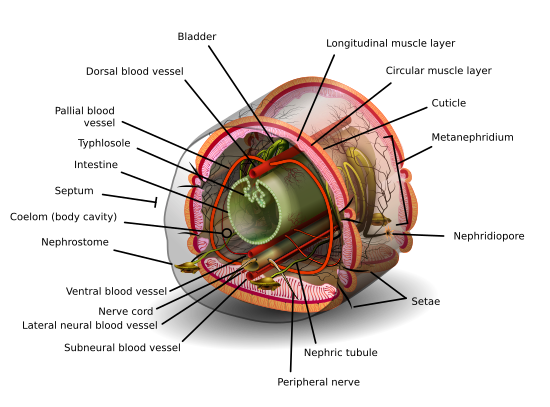
|
|
A cross section of a post-clitellum segment of an annelid (ringed worm); almost all segments of an annelid contain the same set of organs and parts, a pattern called metamerism. Annelids have no lungs, but rather exchange carbon dioxide and oxygen directly through the moist skin when blood reaches the extremely fine capillaries of the body walls; a dry worm cannot breathe and will die of suffocation. The worm's red blood, which does not consist of platelets or red cells but mostly of a liquid containing suspended hemoglobin, makes a circuit up and down the animal in its closed circulatory systems. Diagram: K.D. Schroeder
Recently featured:
|
July 13
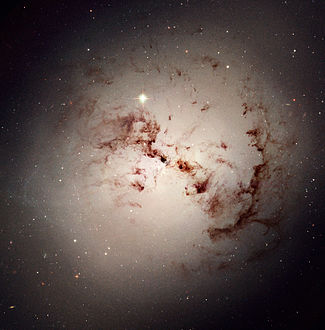
|
NGC 1316 is a lenticular radio galaxy located some 60 million light-years away in a cluster in the constellation Fornax. It is thought to have formed from a merger of two or more galaxies approximately 3 gigayears ago and to have a supermassive black hole in the center. Photo: NASA, ESA, and The Hubble Heritage Team (STScI/AURA)
Recently featured:
|
July 14
|
A panoramic view of Auckland, the largest and most populous city in New Zealand. At the far left is the Auckland Harbour Bridge; prominent in the centre-left of the photograph are the Sky Tower and the Auckland Central Business District, which is one of the most built-up areas in the country. Photograph: Christian Mehlführer
Recently featured:
|
July 15

|
Cupha erymanthis is a species of brush-footed butterfly found in forested areas of tropical South and Southeast Asia which may feed on liquids from carrion. This specimen was photographed in Kadavoor, Kerala, India. Photograph: Jkadavoor
Recently featured:
|
July 16

|
The buffy hummingbird (Leucippus fallax) is a South American species of hummingbird. It can be found in subtropical or tropical dry forests, mangrove forests, and dry shrubland; it prefers living near the canopy. Photograph: Wilfredor; edit: Julia W
Recently featured:
|
July 17

|
Schloss Johannisburg is a schloss in Aschaffenburg, Germany, that was erected between 1605 and 1614 by Georg Ridinger. This red sandstone building overlooks the River Main. Photograph: Rainer Lippert; edit: Carschten
Recently featured:
|
July 18
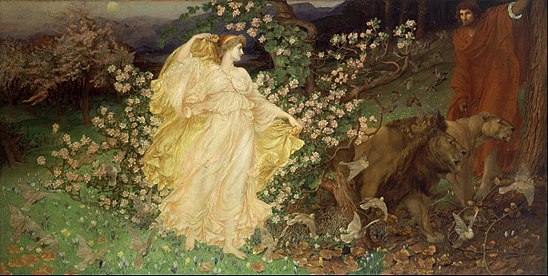
|
|
Venus and Anchises (1889/90), an oil painting by William Blake Richmond which depicts the goddess Venus and her mortal lover Anchises. Richmond, although better known as a portrait painter, aspired to create large, allegoric works; this drive also influenced his workings in glass mosaics. Painting: William Blake Richmond
Recently featured:
|
July 19

|
A species of Odontomyia, from the soldier fly family; these small insects are generally scavengers. Photo: Muhammad Mahdi Karim
Recently featured:
|
July 20

|
The crew of Apollo 11, which, 45 years ago, became the first manned mission to land on the Moon. From left to right: Neil Armstrong, commander; Michael Collins, command module pilot; and Edwin "Buzz" Aldrin, lunar module pilot. Armstrong and Aldrin spent almost a day on the Moon, including several hours outside their lunar module collecting lunar material; Collins remained in the command module in orbit. Photograph: NASA
Recently featured:
|
July 21

|
Beppe Grillo (b. 1948) is an Italian comedian, actor, blogger and political activist who established the Five Star Movement in 2009. Born in Genoa, Grillo became well known as a comic through several television shows in the 1980s, but following jokes which attacked the corruption of the Italian Socialist Party and its leader Bettino Craxi he was banned from television. Grillo continued to tour as a comedian while speaking out against corruption and banking scandals, and in 2005 Time named him a European hero. Photograph: Niccolò Caranti
Recently featured:
|
July 22

|
A female (top) and male orange-bellied parrot (Neophema chrysogaster), photographed in Melaleuca, Tasmania, Australia. First described by John Latham, this small parrot breeds only in South West Tasmania. Fewer than 50 individuals are known in the wild, and the species is considered critically endangered, though there is a captive breeding population. Photograph: JJ Harrison
Recently featured:
|
July 23

|
Australian artistic gymnast Lauren Mitchell (b. 1991) performing a layout step-out on the balance beam during the 41st World Artistic Gymnastics Championships in London, United Kingdom, on 14 October 2009; at the Championships, Mitchell won two silver medals, one for the balance beam and another for floor exercises. Since her first medal in 2007, Mitchell has placed in the World Championships, World Cup, and Commonwealth Games, and competed in two Olympic Games. Photo: Steven Rasmussen; edit: Keraunoscopia
Recently featured:
|
July 24

|
A map of the U.S. invasion of Tinian, one of the Northern Mariana Islands, during World War II. The 4th Marine Division landed first, on the northern end of the island on 24 July 1944, while the USS Colorado and USS Norman Scott led a diversion with a feint against Tinian Town. The 2nd Marine Division arrived the following day, and the Marines worked their way south as Japanese soldiers fought by night and retreated by day. On 31 July the Japanese led a final suicide charge, and some continued to hold out well after the Americans declared victory. The Americans suffered 1,899 casualties, including 328 killed, while the Japanese lost 8,010 men – more than 90% of their original strength. Map: Grandiose
Recently featured:
|
July 25

|
The Tsarskoye Selo Lyceum is a lyceum in Tsarskoye Selo, near Saint Petersburg, Russia. Opened in 1811, the school produced 286 graduates, including the poet Anton Delvig and statesman Dmitry Tolstoy, before it was moved to Saint Petersburg in 1844. Photo: Florstein
Recently featured:
|
July 26

|
A white-throated rock thrush (Monticola gularis) found in Khao Yai National Park, Thailand. These thrushes live in forested areas, shrublands, and rocky areas through much of east Asia. They feed mainly on invertebrates. Photo: JJ Harrison
Recently featured:
|
July 27
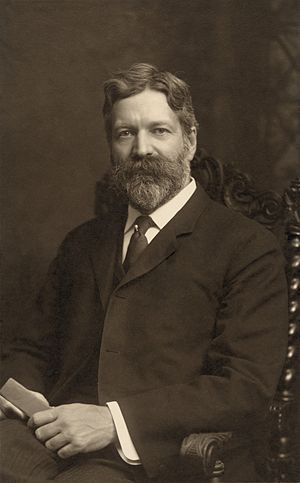
|
George Foster Peabody (1852–1938) was an American banker and philanthropist. Born in Columbus, Georgia, he and his family moved to Brooklyn in 1866. The young Peabody found work in a wholesale dry goods firm while educating himself through the library of the local YMCA. Through his involvement with the Reformed Church, Peabody met Spencer Trask, and when Trask established his own investment house in 1881 Peabody joined him. Over the following 25 years Peabody amassed a fortune through his various investments, retiring in 1906 to focus on philanthropic work, which included providing the initial funding for the Peabody Awards. Photo: Pach Brothers, restoration: Adam Cuerden
Recently featured:
|
July 28
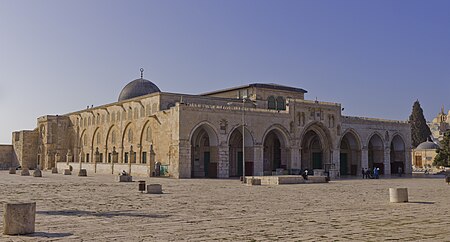
|
|
Al-Aqsa Mosque is the third holiest site in Islam and is located on the Temple Mount in the Old City of Jerusalem. Established in 705 CE by al-Walid, the mosque has been destroyed and rebuilt several times over the centuries. It is currently administered by charitable trust, and the mosque's imam is Grand Mufti of Jerusalem Muhammad Ahmad Hussein. According to Islamic tradition, Muhammad was transported from the Sacred Mosque in Mecca to al-Aqsa during the Night Journey. This tradition holds that Muhammad led prayers towards this site until the seventeenth month after the emigration, when God directed him to turn towards the Kaaba. Photograph: Andrew Shiva
Recently featured:
|
July 29
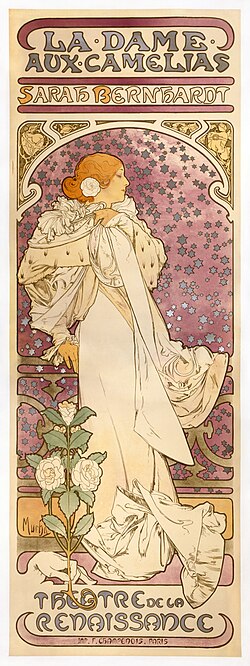
|
A poster advertising an 1896 play, starring Sarah Bernhardt, based on Alexandre Dumas's 1848 novel The Lady of the Camellias. Bernhardt starred in Paris, London, and several Broadway revivals of the story, as well as a 1911 film directed by André Calmettes and Henri Pouctal. The title role of the tragic courtesan Marguerite Gautier became coveted amongst actresses, and Bernhardt coached Ida Rubinstein in it before her death. This poster was designed by the Czech Art Nouveau painter Alphonse Mucha. Mucha had signed a six-year contract with Bernhardt in 1895, following the success of his poster for Victorien Sardou's Gismonda, in which Bernhardt starred. Mucha used pale pastel colors and frequently featured beautiful young women in flowing, vaguely Neoclassical robes in his posters; these women were often surrounded by lush flowers which sometimes formed halos behind their heads. Poster: Alphonse Mucha; restoration: Adam Cuerden
Recently featured:
|
July 30

|
|
Prasat Sikhoraphum is a 12th-century Khmer temple located between the cities of Surin and Sisaket in Thailand. Photograph: JJ Harrison
Recently featured:
|
July 31

|
Orchis mascula is a herbaceous plant of the orchid family. Found in much of Europe as well as the Middle East and northwest Africa, it blooms from April to June. Photograph: Tuxyso
Recently featured:
|
Picture of the day archives and future dates


